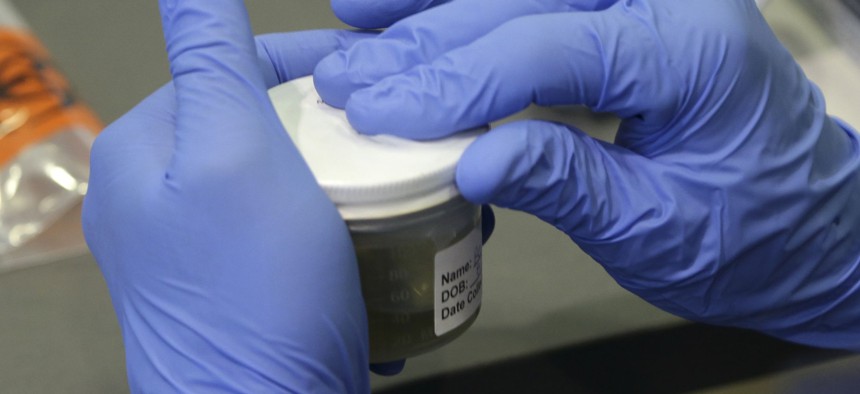Why Winter Won't Kill Zika

A Florida Department of Health employee processes a urine sample to test for the Zika virus, Wednesday, Sept. 14, 2016, in Miami Beach, Fla. Lynne Sladky / AP Photo

Connecting state and local government leaders
Colder weather kills mosquitoes, but it doesn't mean the virus is no longer a threat.
Okay, good news first: Mosquito season in the United States is basically over—even in warmer regions, like Florida and areas along the Gulf Coast. “The risk of mosquito transmission of viruses goes way down by the end of October,” says Peter Hotez, a pediatrician and the dean for the National School of Tropical Medicine at Baylor College.
By early November, he told me, West Nile Virus and dengue fever pretty much “disappear” for the winter. Does this mean everyone can stop worrying about the Zika virus, too?
Well, here’s where the bad news comes in.
Zika isn’t a threat that’s going away anytime soon, despite the fact that in most areas of the U.S., cold weather brings the risk of mosquito-borne illnesses like Zika down to nearly zero. (In the Southernmost regions of Florida and Texas, the risk of such viruses declines in the winter, but doesn’t go away entirely.) The thing is, scientists still don’t understand Zika well enough yet to predict with certainty what’s going to happen in the months to come. It still seems like the outlook for Zika becomes more alarming with each new discovery. As my colleague Julie Beck wrote in September, we’ve learned a lot about the virus this year:
Zika was determined to definitively cause the birth defect microcephaly and the neurological disorder Guillain-Barré. Scientists learned the mosquito-borne virus can also be spread sexually… by women as well as men, and that it can survive in semen for weeks or possibly months.
There’s more. Scientists have found evidence that Zika can cause serious damage to adult brains. Zika seems to remain potentially deadly to a fetus even late in a woman’s pregnancy. The virus itself appears to have mutated to become more dangerous to humans. In at least one rare case, researchers found Zika can be transmitted by casual physical touch.
Plus, one recent study found that Zika-carrying mosquitoes can transmit the virus to their offspring—meaning Zika could last through the winter in a well-protected mosquito egg, even if the original carrier mosquito died. The findings from that research, published in the American Journal of Tropical Medicine and Hygiene in August, also have warm-weather implications. “It makes control harder,” said Robert Tesh, a co-author of the study, in a statement when it was published. “Spraying affects adults, but it does not usually kill the immature forms—the eggs and larvae. Spraying will reduce transmission, but it may not eliminate the virus.”
This kind of transmission—Zika passed from mama mosquito to baby mosquito—appears to be relatively rare. One in 290 mosquito offspring got infected in that study. But even that relatively low rate of transmission can be significant, considering how many mosquito eggs are out there. A female Aedes aegyptimosquito easily lays about 1,000 eggs in her short lifetime, and those eggs are startlingly durable. They’re able to survive anywhere there’s a bit of moisture and enough warmth. (Even when it’s cooler out, eggs laid on dry surfaces can survive for more than a year, and won’t hatch until they get wet.) “We don’t know for sure, but I believe that the risk of Zika will resume next summer,” Hotez told me.
Perhaps most significant of all is the fact that there still isn’t a reliable Zika vaccine—though scientists have taken several important steps toward that goal. All of this means that, in a few months, when the weather begins to warm up, public health officials will again be tasked with figuring out how best to protect their communities.
In the meantime, scientists and local officials who need funding for vaccine development and mosquito-prevention efforts will have to face the misconception that the Zika threat is largely over, that catastrophe was somehow successfully averted in the United States.
That just isn’t true.
Florida may be the only state in the U.S. which has confirmed local transmission of the virus, but there are (at least) tens of thousands of travel-related cases of the virus across the country and U.S. territories. “I think most people don’t realize that in the U.S., including our territories, Puerto Rico mainly: 23,000 cases of Zika already,” said Sylvia Mathews Burwell at the Washington Ideas Forum in September. “Here in the 50 states there are over 3,000 cases. And the other thing I think most people don’t realize is that we’ve already had 21 births in the 50 states and territories—children who are born with microcephaly and test positive for Zika.”
On top of all that, it will take years or longer before Zika’s wide-reaching epidemiological and economic impacts can be fully measured. Winter weather will help kill mosquitoes, but the fallout from the ongoing Zika outbreak is likely to continue for many seasons to come.
Adrienne LaFrance is a staff writer at The Atlantic, where this article was originally published.

NEXT STORY: Colorado: A Governing Success Story




